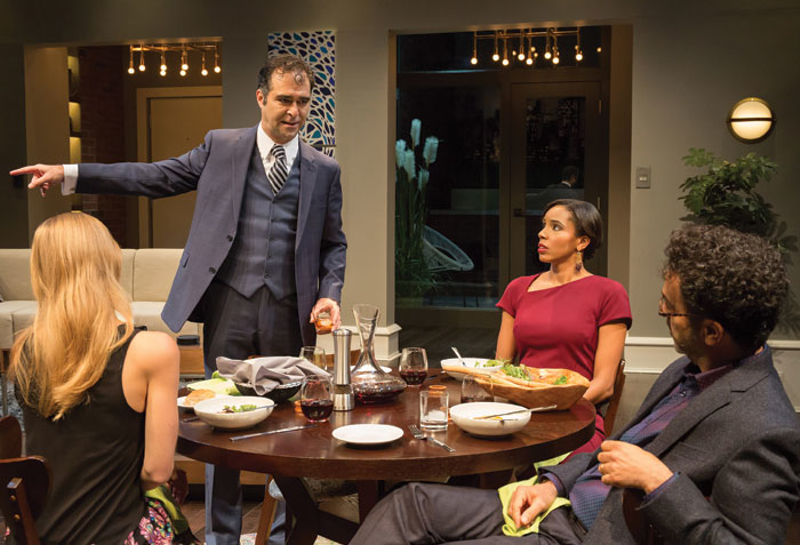Almost from its first moment, Ayad Akhtar’s Pulitzer Prize-winning play puts audiences on alert that differences of opinion will become extreme. Amir Kapoor (Barzin Akhavan), an aggressive mergers and acquisitions attorney of Pakistani descent, poses for his thoroughly American wife, Emily (Bethany Jillard), an up-and-coming painter. Sitting in their sleek Manhattan apartment, he wears a suit coat, an expensive dress shirt and tie, but no pants — just his jockey shorts, since she’s painting his portrait from the waste up. Nevertheless, his dignity seems a bit tentative, even though he speaks authoritatively, answers several important calls on his mobile phone and complains about how much work he’s doing to support one of the Jewish partners at his firm.
Amir disputes Emily’s psychologizing about an awkward encounter with a waiter the night before that inspired her to paint him. She’s referencing Diego Velázquez’s “Portrait of Juan de Pareja” (circa 1650), which depicts an Islamic Moor who was the artist’s slave. Emily has become enamored of Islamic art, appropriating it in various ways into her accelerating career.
Their sparring is interrupted by the arrival of Amir’s nephew Hussein (Amin El Gamal), who’s changed his name to Abe to obscure his Middle Eastern roots. It’s quickly apparent that Amir and his nephew are at opposite ends of a spectrum: Amir has stepped far away from Islam, while his nephew, involved with activists and eager to help an imam who’s an alleged terrorist, is drawn closer to the faith. Amir tells Hussein about his boyhood infatuation with a girl who turned out to be Jewish, claiming that the faith he has abandoned is primitive, anti-intellectual and hateful.
But subsequent events reveal that Amir’s conflicted feelings are neither simple nor entirely evolved. Emily is currying favor (and perhaps more) with Isaac (Maury Ginsberg), a curator at the Whitney who is contemplating including her Islamic-inspired paintings in an upcoming show. Emily and Amir are also social acquaintances because Rory (Krystal Lucas), Isaac’s cool and collected African-American wife, happens to be another rising attorney at the firm where Amir works.
When Isaac and Rory turn up for a celebratory dinner a few weeks after Amir has been quoted in The New York Times about the imam, it’s off to the races with religious, ethnic and philosophical combat. It might seem a tad glib to have a Muslim, a Jew, an African-America and a WASP at dinner — rather like a set-up for a joke. But there’s more horror than humor in Akhtar’s 2012 play, which has become increasingly impactful with several years of rising violence in the Middle East and fears about immigrants in the U.S.
In fact, the playwright shines a harsh light on each of the central characters. Amir has struggled to be thoroughly Americanized, but he can’t completely shake his roots; his consumption of alcohol exacerbates his feelings and unleashes his practiced restraint. Isaac rises to the defense of Israel, but his own attitudes are snappishly conservative and judgmental.
The women are not so outspoken, but they are catalysts for further amplification of heated argumentation. Emily’s appropriation of Islamic images for her own purposes is naive and self-serving, while Rory withholds information from Amir about his status at the law firm, circumstances likely to accelerate her own success. Each character throws enough fuel on the flames of their heated conversation to cause a catastrophic conflagration grounded in the complexities of opinions and perspectives that are prevalent in today’s America. (The play is clearly rooted in fears and anxieties gripping contemporary America, but the characters’ prejudices and behaviors are built on a universal aspect of human nature that has made this play a hit in London, Australia and beyond.)
Ironically, it’s Amir’s young nephew who distills the essence of anger behind these disputatious characters. When Amir tries to calm the young man, potentially on the brink of further radicalization, another fuse is lit. Hussein accuses Amir, saying he will “always turn on your own people.” He continues, “For three hundred years they’ve taken our land, drawing new borders, replacing our laws, making us want to be like them. Look like them. Marry their women. They disgraced us. They disgraced us. And then they pretend they don’t understand the rage we’ve got.”
It’s a hard message, one I imagine some theatergoers will not appreciate. But it’s a perspective we need to listen to and try to understand, and this production will certainly provoke thought and conversation.
DISGRACED, presented by the Cincinnati Playhouse in the Park, continues through Oct. 23 on its Shelterhouse Stage. For tickets and more information, visit cincyplay.com.






